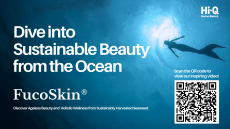Certifying 'microbiome-safe' baby skin care

As of September 2023, 100 global companies – including Henkel, DSM-Firmenich and Water Wipes – have acquired independent microbiome-friendly certification for their product through MyMicrobiome.
The certification company only gives its 'seal of approval' to microbiome-friendly products that meet certain stringent criteria in terms of their impact on the microbiome.
According to MyMicrobiome’s CEO Dr Kristin Neumann, the microbiome movement has become unstoppable in the beauty and personal care industry. " An increasing number of companies seek our unique certification mark to substantiate their claims,” she shared. “The microbiome topic is here to stay.”
The company offers seven testing standards for cosmetic products – for adult skin, infant skin, scalp, vagina, mouth, foot and nose. For each standard it applies a different panel of key microbes depending on the usage of the product.
“A cosmetic product that is certified as microbiome-friendly must not influence the balance and diversity of the skin´s microbiome in any way,” she explained.
The tests are performed in vitro and designed to show that the product has no influence on the microbiome whatsoever.
“We do not want to see any influence of the product, which is best to prove in vitro, she explained. “So we carry out a series of elaborate tests to detect if the product shows an impact on the skin's microbiota and to which extent.”
For Neumann, less is more and mild products with a short INCI list have the best chance to pass.
"Our certification is a beneficial tool for customers. They can be sure to purchase a product which is friendly to their skin or scalp microbiome – for a microbiome-friendly world,” she shared.
The microbiome-safe mark for baby care
Baby products is an important category in terms of monitoring a product's effect on the microbiome, as the microbiome of a baby’s skin is very different to that of an adult.
Therefore, MyMicrobiome certifies baby products (from birth to age three) differently to ones for adult skin.
“After birth, a baby's skin must adapt from what was previously a largely sterile and moist environment to a gaseous environment with various environmental influences,” explained Neumann.
“The hitherto completely microbe-free skin must now learn to cope with solar radiation, bacteria, fungi, but also mechanical influences such as friction from fabrics and contact with chemicals,” she continued.
According to Neumann, a baby´s skin microbiome changes at the age of three by its composition of key microbes. In the first years it is dominated by five key microbes: L. crispatus, S. epidermidis, S. mitis, C. tuberculostearicum and P. acnes.
Certification for this category is extremely important as these are such formative years that could potentially affect skin barrier function for the rest of the person’s life.
“The working assumption is that a "systematic" colonisation of the child's body during the first months of life helps the skin to develop as a reliable barrier against inflammatory infections and other diseases,” explained Neumann.
Meanwhile she said that an adult's skin is colonised by completely different range of bacteria.
"The skin microbiome of an adult is different as it's defined by C. tuberculostearicum, P. acnes, S. mitis, S. oralis, M. luteus, M. globosa, S. epidermidis, S. capitis, S. hominis," concluded Neumann.




























